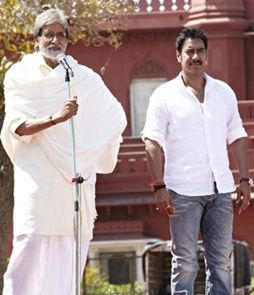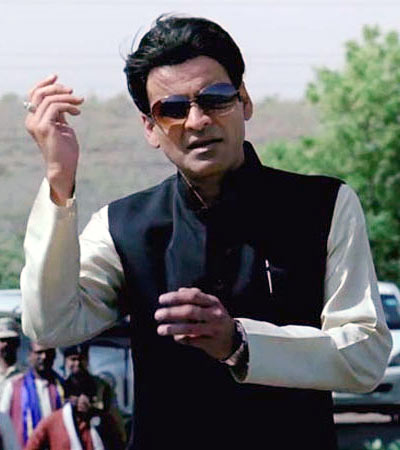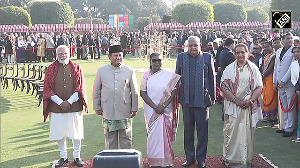 Satyagraha attempts to speak about important issues but ends up over-simplifying them, says Paloma Sharma.
Satyagraha attempts to speak about important issues but ends up over-simplifying them, says Paloma Sharma.
Prakash Jha's much-awaited political thriller, Satyagraha has a heart of gold.
Made in the right political climate, it's a film to watch out for.
On the surface, the plot is uncomplicated -- a retired school principal and chief of a small town, fed up with the system of governance, slaps the collector of his zilla (district).
Dwarka Anand (Amitabh Bachchan) is a man of staunch Gandhian principles. A retired school headmaster, Dwarka inculcates the same values in his son Akhilesh (Indraneil Sengupta) -- an engineer.
When Akhilesh is killed, minister Balram Singh publicly declares a hefty amount in compensation for Akhilesh's widow, Sumitra (Amrita Rao).
Despite this, Akhilesh's father and his widow receive nothing. Eventually, after Sumitra is humiliated in the government office, Dwarka Anand seeks a meeting with the openly corrupt and arrogant collector, whom he ends up slapping which leads to him being put behind bars.
Akhilesh's best friend Manav Raghavendra (Ajav Devgn), an extremely ambitious entrepreneur with capitalistic values and a man Dwarka Anand disapproves of, returns from the USA and gets the best lawyers available to ensure the release of his deceased best friend's father.
Unable to do so through legal channels, Manav resorts to building a social campaign that spirals into a bigger protest against the system than any of them could have imagined.
While it would be useless to comment on Amitabh Bachchan's performance, for he remains flawless as ever, it was a tad difficult to watch Ajay Devgn slip out of his Singham avatar and try on a more sensitive role, making one wonder where Omkara had disappeared.
His lady love, Kareena Kapoor, who plays TV journalist Yasmin Ahmed, comes off as a natural even though she does not have much to work with. It is a little sad, that the other actress in the film -- Amrita Rao -- doesn't quite get it right.
Rao recedes in the background in the crowded star cast at crucial points. Neither is she always present in scenes.
There are moments, just tenths of a second, when you'll see her lost amidst the other characters, not completely present in the scene as her expression sometimes shifts to sheer boredom -- and who would blame her? She has nothing much to do except cry and worry about her father-in-law.
Arjun Rampal is adequate in his character, a wannabe bahubali (a local goon with political aspirations) of the area. Although a few notches below his last performance in D-Day, Rampal is fairly believable.
However, the real star of the show is minister Balram Singh aka Manoj Bajpayee. Slick as ever, Bajpayee prowls across the screen with the ease of a veteran jungle cat who is well aware of his apex predator status in the forest.
His coversations are sprinkled with a few English words as he charms people -- both on and off screen -- with his Hindi heartland accent. Soft spoken with theatric hand gestures, a believer in negotiation and a master manipulator, Balram Singh is the morally bankrupt politician. If you need just one reason to watch this film, Manoj Bajpayee is it.
Also, Satyagraha has its fair share of good music. From Raske bhare tore naina (avoid the video though) to Satyagraha, music composer duo Salim-Sulaiman successfully capture the atmosphere of a protest in their pro-people anthem, Satyagraha.
However, as well-meaning and youth-friendly as Meet Brothers would have wanted their track to sound, Janta Rocks doesn't quite nail it. The phrase itself seems a little odd but then again, perhaps that is because I have never been a fan of Hinglish.
There are times when Satyagraha makes you cry, especially during the scenes where Dwarka Anand mourns the loss of his only child.
There are also scenes that will make you cringe and wish you'd carried a paper bag along to puke in. If you're smart, you'll know that you ought to close your eyes when Jha begins a new (and extremely awkward) track which has Manav and Yasmin indulging in some heavy-duty romance.
Satyagraha starts off well and manages to engage the audience for the first 30-40 minutes but it slowly begins to lose its touch. It becomes preachy to the point of making you want to role your eyes.
Clearly inspired by the Anna Hazare movement, Satyagraha attempts to replicate it and explain what went wrong. What went wrong with the film itself, is the delayed climax.
If you have lofty ideas for your country or are just plain sick and tired of the corruption that has crept in, Satyagraha is definitely for you. However, if you follow politics and have had the opportunity to open a newspaper, just avoid it.
Satyagraha attempts to speak about important issues but ends up over-simplifying them. Nevertheless, it is a good attempt.
Rediff Rating: 











 © 2025
© 2025